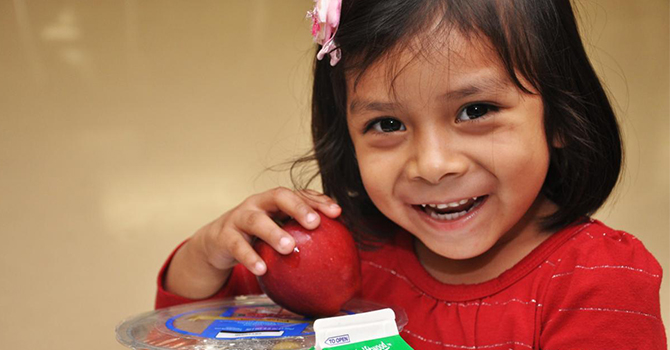Are Probiotics Right for Your Child?

Emily Bair
MS, Biomedical Anthropology; MPH Candidate, Nutritional Sciences
Recently, a good friend of mine with young children asked me, "what do you think about probiotics for kids?" My nutrition courses had explored the use of probiotics for adult medical nutrition therapy and their benefits for premature infants but I was less aware of their potential benefits for young children or adolescents, so I decided to investigate.
Probiotics, according to the U.S. Food and Drug Administration (FDA), are products that contain live organisms that are found naturally in humans.1 Products containing the label of "probiotics" must contain a sufficient number of viable microorganisms to alter the microflora of the individual consuming them and have a beneficial effect.1 The use of probiotics as an over-the-counter treatment for a menagerie of conditions, from childhood asthma to IBS, has grown for years, with retail sales topping $35 billion worldwide as recently as 2014.2
The standard benefits of these probiotic products are thought to be related to inherent biological features of the beneficial bacteria that are contained within them. These bacteria are able to fight and prevail against other pathogenic, or harmful, bacteria often found in the human GI tract.3 They are broken into three categories: fermentive, obligatory anaerobic, and nonmotile members of the genera Lactobacillus, Bifidobacterium, and Streptococcus.3 Here's a quick breakdown of each category:
- Fermentive – these bacteria break down fiber in the large intestine via fermentation, similar to the process that occurs in beer brewing.
- Obligatory anaerobic – some bacteria thrive best in oxygen rich environments, others in oxygen poor environments. Bacteria that thrive inside the human body are typically obligatory or facultative anaerobes, meaning they require or prefer a poor oxygen environment.
- Nonmotile – these microscopic bacteria move very little once they are imbedded into the intestine. This feature enables them to inhabit niches in the gastrointestinal tract that might also attract harmful bacteria.
For over a decade, there have been claims that probiotic use in children, specifically, could benefit gastrointestinal disorders, colic, upper respiratory infections and allergies.2,3 According to a report by the American Academy of Pediatrics, it is thought that during digestion in the intestine, probiotic microbes make chemical byproducts. These metabolites are thought to function as immune system or digestive modulators, helping the body perform its normal functions better.
In a recent review of the benefits of probiotic use in children, however, evidence-based practice recommendations suggested contrasting results to these previous claims.2 The current recommendations suggest:2
- Certain strains, or types, of bacteria are more beneficial for particular diseases than others. For example, the strain Lactobacillus reuteri is most beneficial to improving colic symptoms in breastfeeding infants, while most Lactobacillus and Bifidobacterium species are best used to prevent upper respiratory tract infections (URIs), commonly seen in the pediatric world as ear infections.
- Probiotics can be used as a prophylactic treatment, or preventive measure, for some diseases but not all. Studies show that daily probiotic use can reduce the risk for the development of repeat ear infections and reduce the duration of the infection but they have not been shown to prevent the development of respiratory or gastrointestinal allergies.
- Probiotics may be used as a treatment in kids for the some of the same issues for which they are used in adults. Some common GI issues experienced by kids and adults alike such as abdominal pain, IBS, acute gastroenteritis, or diarrhea associated with an antibiotic course could be remedied with the use of probiotics.
Right now, various preparations of probiotics are currently marketed for use in infants and children. These include liquids that come "consumer-ready" as in formulas or probiotic drinks, powders that can be mixed into a child's food, or fun shaped chewable or gummy tablets. While probiotic products are marketed as a catchall approach to improving health, scientific evidence does not yet prove their use to be effective in all childhood ailments.
To sum up and answer my friend's original question, current research points towards the benefit of probiotics for certain health concerns, rather than general prophylactic use. Therefore it might be beneficial to a child to take probiotics if there is a general concern for URIs (mainly in the form of ear infections) but not so if the only health concern present is a peanut allergy. Long story short, whether or not taking probiotics is the right choice for your child depends on their individual needs.
References
- 1. Center for Biologics Evaluation and Research. (2016, April). Science & Research (Biologics) - FDA developing improved methodology for determining purity of probiotic products. Retrieved from https://www.fda.gov/biologicsbloodvaccines/scienceresearch/ucm493702.htm
- 2. Dassow, P., & Fox, S. (2016). When can infants and children benefit from probiotics? Journal of Family Practice, 65(11), 789-794. Retrieved from http://www.mdedge.com/jfponline/article/116701/pediatrics/when-can-infants-and-children-benefit-probiotics
- 3. Thomas, D. W., Greer, F. R., & Committee on Nutrition: Section on Gastroenterology, Hematology, and Nutrition. (2010). Clinical Report-Probiotics and Prebiotics in Pediatrics. Pediatrics, 126(6), 1217-1231. Retrieved from http://pediatrics.aappublications.org/content/early/2010/11/29/peds.2010-2548
About the Author
Emily Bair is a second year Master of Public Health student in Nutritional Sciences
at the School of Public Health at the University of Michigan. She has a Masters of
Science in Biomedical Anthropology and bachelors in Anthropology and Biology. She
is interested in pursuing a career in pediatric dietetics and has specific research
interests in breastfeeding, skeletal development, and interdisciplinary healthcare
education. She currently works as a Graduate Researcher and Consultant for LiquidGoldConcept,
Inc. a social impact start-up that specializes in producing evidence-based, hands
on, comprehensive breastfeeding education technologies.
